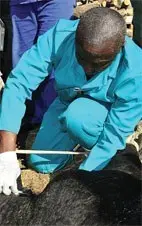ACOMMON TRAIT in many African countries seems to involve a reduced emphasis on agricultural training when the country achieves independence. In Nigeria an excellent system of teaching farming and gardening in primary schools was abandoned soon after an independent state was created in 1960.
At the time parents said they sent their children to school to get away from farming and find a job in the nearest town. Largely due to the massive level of unemployment, the situation has changed all over Africa.
Agricultural training now critical Training for careers related to agriculture is now see as critical if the twin aims of feeding everyone and promoting exports are to be achieved. Namibia’s new Minister of Agriculture, Forestry and Fishers, Tina Joemat-Pettersson, recently signed a Memorandum of Understanding with South Africa. While much of the improved cooperation will involve the marketing of meat and livestock, a crucial area covers training. South Africa has agreed to start accepting qualified Namibian students for training in veterinary science.
They will play a vital role into research on a range of animal diseases as well as the inspection of meat for export and home consumption. Recent livestock disease in Namibia’s zone of Africa have included Foot and Mouth Disease and Rift Valley Fever An effective veterinary service is essential in most African countries today. In addition to the bi-lateral assistance that will hopefully develop between Namibia and South Africa, there are also some notable international initiatives. One is the Africa Land and Food Fellowship programme launched in 2006 at the South African High Commission in London by the High Commissioner, Lindiwe Nabuza.
The programme is operated by the Royal Agricultural College at Cirencester in the UK. Past African students have included Hassan Ali of Somalia, Boyle Diamini of Swaziland and Joshua Muro of Tanzania. The RAC’s President is Prince Charles who is widely acknowledged to be a leader in moves to make commercial farming more environmentally friendly. In his own words he would like the college to balance “food production against protection of the resource base on which it depends”.
One overseas student commented that he hoped “to become versed in international rural development issues, particularly in sustainable organic systems, so that I can work with farmers back home in targeting niche markets”. Exporting vegetables and fruit from Africa to Europe is increasingly competitive and requires a detailed knowledge of the growing, inspection and marketing of the crop before it reaches the consumer. Training initiative A training initiative that has come to light recently is in what is being called “The Not for Profit Sector”. Students from a Cambridge, UK, business school went to Kenya to investigate the potential for lowcarbon sources of energy in the production of tea. They were helped by the Kenya Tea Development Authority and the Fairtrade Foundation with the aim that eventually some Kenya teas could be sold under an environmentally friendly label.
Hopefully Fairtrade initiatives in other sectors scuh as coffee, fruit, vegetables and flowers will provide opportunities for new training initiatives. Increasingly training in the agricultural sector is being provided on a short course basis. In Natal, South Africa, the East Coast Intensive Horticultural group recently held an Annual Growers Day covering the use of coco peat, green manuring, organic fertilisation and new biotechnology in pest and disease control. The Agricultural Reser4ach Council at Irene, near Pretoria, run short course s in cheese making, meat processing and small stock management.
An encouraging development in Tanzania was the recent announcement of a joint venture between Tanzania Distilleries Ltd and the South African company Distell to provide training in modern viticulture. Planting material will be brought from South Africa and the aim is to train farmers to manage their vines to produce one crop a year instead of the present two. Apparently this is essential to obtain maximum yields and quality.
Contacts: Royal Agricultural College, Cirencester, GL7 6JS, UK/ http://www.rac.ac.uk
Agricultural Research Council, Irene, South Africa. Tel: (012) 672 9223





